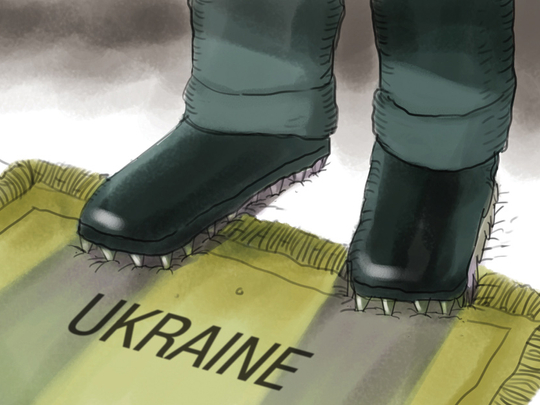
It’s late August. Western politicians are trickling back to their offices, glumly hoping that while they were away some of the problems bothering them at the end of July have sorted themselves out.
Alas for them, the Ukraine imbroglio is still here, and if anything has got worse. Kiev wants to end armed resistance in the east once and for all, and has made important progress towards achieving that.
Russia has recently been scrambling to avoid the fiasco of the “rebels” in eastern Ukraine collapsing completely and has been forced to send soldiers into Ukraine openly. Moscow’s military moves are an invasion of a European sovereign state whose borders touch several EU members, an unambiguous act of aggression under the UN Charter.
Some of these hapless troops have been captured and Russia is reduced to blathering that its personnel are in Ukraine “by accident”. Amid this mayhem, Petro Poroshenko, the Ukrainian president, has called for new parliamentary elections in October as the already weak economy deteriorates.
And high-level diplomacy continues. Russia’s Vladimir Putin and Poroshenko have met in Minsk at a gathering featuring other heads of former Soviet republics, with senior EU figures hovering in the margins. Before this encounter, Angela Merkel, the German chancellor, visited Kiev to have a heart-to-heart talk with Poroshenko.
Poland is watching keenly: a senior Polish foreign policy adviser warns that Germany, Italy and Holland are so dependent on Gazprom that they are like “rabbits in the desert paralysed by the stare of the snake”.
How should Western capitals respond as the Kremlin digs in? EU and US sanctions will cost the Russian economy staggering losses in the years to come, but even targeted sanctions are slow and imprecise. And Russia’s economic base is healthier than Ukraine’s. The uncertainty and ill-will these measures create hit ordinary Ukrainians, too.
In these conditions, can a deal be done to end the crisis? Russia’s “principled demands” are unchanged: that Ukraine stay independent of all “blocs”; that Ukraine’s eastern areas get radical autonomy allowing them special economic relations with Russia; and that Ukraine kisses goodbye to Crimea.
A settlement that Russia probably favours is the Bosnia-isation of Ukraine. Ukraine loses Crimea, where Russia wins all but pretends that the issue is still open: “let future generations decide”.
Otherwise, Ukraine’s territorial integrity is preserved on paper, but some regions have something like the autonomy given to Republika Srpska, the “Serbian” entity within Bosnia and Herzegovina. These areas could then be merged into Russia’s economic and political space as Moscow decides, but through them the Kremlin also would enjoy an effective veto on strategic choices made in Kiev: Ukraine in practice ends up “independent of blocs” (that is, is unable to join Nato or move too close to the European Union), while in theory such options are not closed off.
Such an outcome might be attractive to many Western capitals, on the pragmatic basis that it is the best outcome now available. It gets normal European business back on track. And while the Middle East blows up, do we really have time to care about impenetrable Slav-on-Slav rivalry anyway?
Obviously it’s humiliating for Ukraine to accept anything like this. But in return for leaning on Kiev to swallow its pride, Brussels and Washington might offer Ukraine sizeable economic reform packages and trade deals which will help Ukraine shake off its economic weakness in the years to come and so be much better placed to see off Moscow’s bullying.
As for Crimea, there are European precedents for putting issues in the deep freeze without conceding any point of fundamental principle: for decades during the Cold War, the three Baltic states, Latvia, Estonia and Lithuania, were not recognised by London and other capitals as de jure part of the USSR.
My guess is that for now any Bosnia-style settlement is not going to be acceptable in Kiev. It would mean that Ukrainians are “free” to do only what the Kremlin allows them to do, a servile outcome no self-respecting leader in Kiev — or Washington or Brussels — can or should accept.
Instead a dangerous game of diplomatic chicken will continue. Kiev will press to defeat Russian ambitions around Donetsk. Moscow will tune up its interventions just enough to stop that happening. The area will be wrecked and thousands of Ukrainians will be collateral damage.
Moscow’s policy towards Ukraine in the past year has been a disaster in its own terms, giving Ukrainian identity and self-respect a boost as never seen before.
Putin is counting on other world leaders staring aghast at this brutal intra-Slav trial of strength, and deciding to stay clear of it.
The eternal problem in situations like this is trying to talk about a deal on the level of pragmatic principle while both sides strain to create new facts on the ground. Any outcome that freezes the military situation in eastern Ukraine as it is today amounts to a win for the Kremlin: all Ukrainian territory not controlled by Kiev turns into “something other” and becomes the basis for eventual separatist claims.
However, Putin in turns knows that any outcome that allows Kiev to reassert control over all its territory other than Crimea is a Kremlin defeat. He has not stepped into open illegal warfare just to lose — like Macbeth, he is: in blood stepped in so far that, should I wade no more, Returning were as tedious as go o’er.
— The Telegraph Group Limited, London 2014









